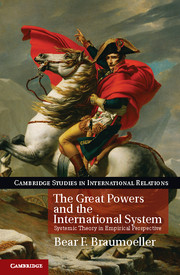Book contents
3 - System, process, and evidence
Published online by Cambridge University Press: 05 January 2013
Summary
In this chapter I describe the procedures by which I have attempted to evaluate the theory's predictions. I set out to evaluate the theory in the context of the three European systems that existed between 1815 and 1991 – the Vienna system, the interwar system, and the Cold War system. In each case, the geographic scope of the system is confined to the European continent, the relationship of the structure of the system to the actors is causally homogeneous over time, and the actors are understood to be those Great Powers or superpowers whose involvement in the affairs of the continent is a necessary factor in the calculations of the others. Europe is a natural choice of domain in each period, because the histories of these periods tend overwhelmingly to describe events and actors within the region; all of the Great Powers, with the exception of the United States, were European, and as a result they tended overwhelmingly to focus on one another and on the other states within the region when formulating and enacting security policy.
The goal of the first half of the chapter is to explain the logic behind the choice, coding, and when necessary gathering of the data used to test the theory described in the previous chapter. To provide a preview, and to serve as a reference in what follows, those data are summarized in Table 3.1. As the discussion so far has suggested, I conclude that Great Powers in the past 200 years have largely focused on power and ideology when thinking about security; these concepts represent the structural dimensions of interest. Nevertheless, as that discussion demonstrates, there are substantial differences, from one period to the next, in how those concepts were understood, as their historical, financial, social, and technological context evolved with the times, and therefore how they should be operationalized.
- Type
- Chapter
- Information
- The Great Powers and the International SystemSystemic Theory in Empirical Perspective, pp. 68 - 111Publisher: Cambridge University PressPrint publication year: 2013

